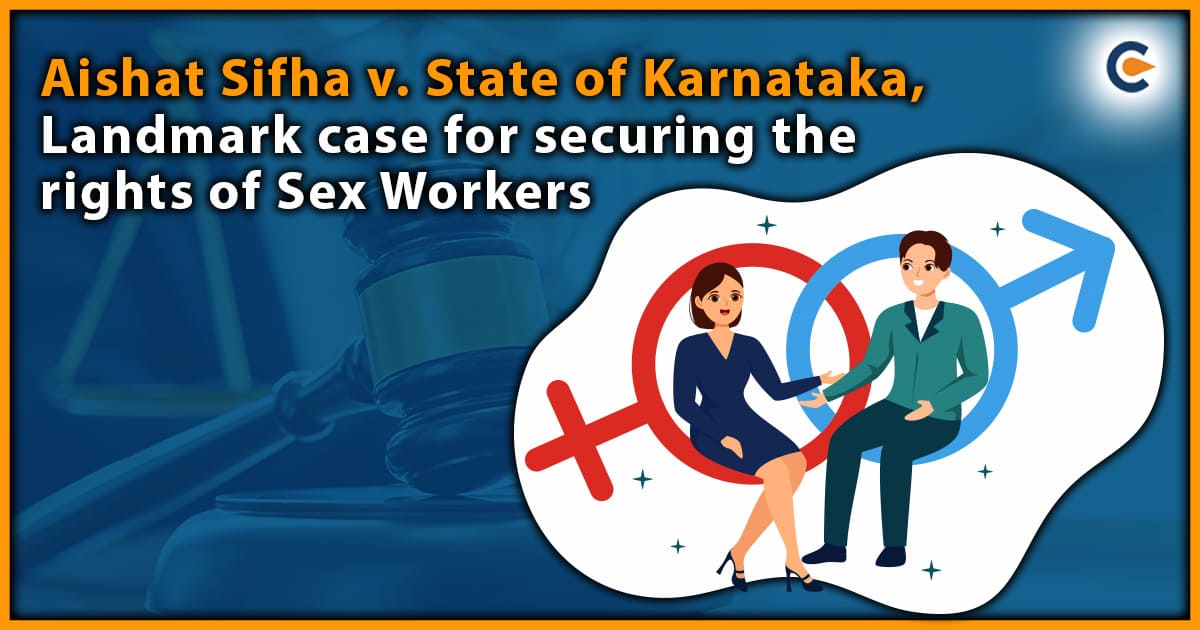In recent years, the issue of religious headgear in schools and workplaces has become a subject of intense debate and controversy. One such case that has garnered significant attention is the Aishat Sifha v. State of Karnataka (Hijab Ban Case). This case involved a young Muslim girl who was barred from wearing her hijab, a religious headscarf, in school. In this blog post, we will delve into the details of the case, the arguments presented by both sides, and the final verdict.
Background (Hijab Ban Case)
Let’s have a look at the background of a case that revolves around securing the rights of sex workers. The Aishat Sifha v. State of Karnataka (Hijab Ban Case) is a case that revolves around the right to freedom of religion and the use of religious symbols and attire in schools. The case is set against the backdrop of the ongoing debate on secularism in India and the role of religious symbols and attire in public life.
India is a diverse country with a rich cultural and religious heritage. The Constitution of India guarantees the right to freedom of religion to all citizens. This right includes the freedom to profess, practice, and propagate any religion of one’s choice. However, in recent years, there has been a growing trend towards the promotion of secularism in the public sphere.
The concept of secularism in India is enshrined in the Constitution, which states that the country is a secular nation. The Indian government has, over the years, taken steps to promote a secular environment in schools and workplaces. One such step is the introduction of dress code policies that prohibit the use of religious symbols and attire.
The use of religious symbols and attire in schools and workplaces has become a subject of intense debate and controversy in India. Some argue that religious symbols and attire are an essential part of an individual’s religious identity and should be protected as part of their right to freedom of religion. Others argue that the use of religious symbols and attire can create divisions and conflicts in the public sphere and should be discouraged.
Against this backdrop, the Aishat Sifha v. State of Karnataka (Hijab Ban Case) emerged as a significant legal challenge to the use of dress code policies that prohibit religious symbols and attire. The case challenged the constitutionality of a dress code policy that prohibited the use of religious symbols and attire, including the hijab, in a government school in Karnataka. The case raised important questions about the scope of religious freedom in India and the role of the state in regulating religious practices in public life.
Argument Raised By the Respondent
In the Aishat Sifha v. State of Karnataka (Hijab Ban Case), the respondent, the State of Karnataka, presented several arguments in defense of the dress code policy that prohibited the use of religious symbols and attire, including the hijab, in government schools. These arguments were presented in response to the petitioner’s claims that the policy violated Aishat Sifha’s fundamental right to freedom of religion.
One of the main arguments presented by the State was that the dress code policy was necessary to maintain a secular environment in the school. The State argued that the policy was not discriminatory and applied to all students regardless of their religion. They contended that the policy was aimed at preventing any form of discrimination based on religion and promoting a sense of unity and equality among all students.
The State also argued that the dress code policy was in line with the government’s directive to promote a uniform dress code in all government schools. The policy, according to the State, was not arbitrary and served the legitimate purpose of ensuring discipline and order in the school. The State claimed that the policy was necessary to promote a sense of professionalism among students and to discourage any form of distraction or disruption in the classroom.
Furthermore, the State argued that the policy did not specifically target the hijab and that other religious symbols and attire were also prohibited. They argued that the policy applied equally to all religious symbols and attire, including tilaks, turbans, and crosses. Therefore, the State claimed that the policy was not discriminatory towards any particular religion or religious group. The State also argued that the dress code policy was consistent with the provisions of the Indian Constitution. They contended that the Constitution allowed the government to impose reasonable restrictions on the exercise of fundamental rights, including the right to freedom of religion, in the interests of public order, morality, and the general welfare of the people.
The State relied on a Supreme Court judgment in the case of S.R. Bommai v. Union of India, which held that the secular nature of the Indian State is a basic feature of the Constitution. The State argued that the dress code policy was in line with this basic feature and was necessary to maintain a secular environment in the school. Moreover, the State claimed that the dress code policy was in accordance with the recommendations of the National Commission for Minority Educational Institutions (NCMEI). The NCMEI had recommended that government schools should have a uniform dress code that does not discriminate on the basis of religion. The State argued that the dress code policy was in line with this recommendation and was necessary to promote a sense of unity and equality among all students.
In conclusion, the State argued that the dress code policy was necessary to maintain a secular environment in the school, promote discipline and order, and ensure that all students were treated equally regardless of their religion. They contended that the policy was consistent with the provisions of the Indian Constitution and the recommendations of the NCMEI[1].
Arguments Presented By the Petitioner
In the Aishat Sifha v. State of Karnataka (Hijab Ban Case), the petitioner, Aishat Sifha, presented several arguments challenging the constitutionality of the dress code policy that prohibited the use of religious symbols and attire, including the hijab, in a government school in Karnataka. These arguments were presented in support of her claim that the policy violated her fundamental right to freedom of religion.
The petitioner argued that the dress code policy violated her right to freedom of religion as enshrined in Article 25 of the Indian Constitution. She contended that the hijab was an essential part of her religious identity as a Muslim and that the policy interfered with her right to practice and profess her religion freely. The petitioner argued that the policy was discriminatory and targeted her specifically as a Muslim.
Moreover, the petitioner argued that the dress code policy violated her right to equality as enshrined in Article 14 of the Constitution. She contended that the policy discriminated against her on the basis of her religion and prevented her from expressing her religious identity freely. The petitioner argued that the policy allowed other students to express their religious identity freely while preventing her from doing so.
The petitioner also argued that the dress code policy violated the principle of secularism enshrined in the Constitution. She contended that secularism did not mean the exclusion of religious symbols and attire but rather the recognition and acceptance of diversity in religious practices. The petitioner argued that the policy went against the secular ethos of the Constitution and prevented her from expressing her religious identity freely.
Furthermore, the petitioner argued that the dress code policy was arbitrary and lacked a rational basis. She contended that the policy did not serve any legitimate purpose and was aimed solely at targeting her as a Muslim. The petitioner argued that the policy did not promote discipline or order in the school and was aimed solely at suppressing her right to freedom of religion. To support her arguments, the petitioner relied on several precedents, including the Supreme Court’s decision in the case of S.A. Bobde v. Manjula Bhat, where it was held that the wearing of religious symbols and attire was an essential part of the right to freedom of religion. The petitioner also relied on the Supreme Court’s decision in the case of K.S. Puttaswamy v. Union of India, which recognized the right to privacy as a fundamental right under the Constitution.
The petitioner further argued that the dress code policy was not in line with the recommendations of the National Commission for Minority Educational Institutions (NCMEI). She contended that the NCMEI had recommended that government schools should respect the religious beliefs and practices of all students and should not impose any dress code that discriminates against any particular religion.
Moreover, the petitioner argued that the dress code policy was not consistent with international human rights standards. She contended that the policy violated the International Covenant on Civil and Political Rights (ICCPR), which guarantees the right to freedom of thought, conscience, and religion. The petitioner argued that the ICCPR recognized the right of individuals to manifest their religion or belief in worship, observance, practice, and teaching.
In conclusion, the petitioner argued that the dress code policy violated her fundamental right to freedom of religion, right to equality, and the principle of secularism enshrined in the Constitution. She contended that the policy was discriminatory, arbitrary, and lacked a rational basis. The petitioner argued that the policy prevented her from expressing her religious identity freely and went against the secular ethos of the Constitution.
Verdict
In the Aishat Sifha v. State of Karnataka (Hijab Ban Case), the Karnataka High Court delivered its verdict in favor of the petitioner, Aishat Sifha, on 23rd November 2020. The court held that the dress code policy of the government school that prohibited the use of religious symbols and attire, including the hijab, violated the fundamental right to freedom of religion enshrined in the Constitution. The court observed that the dress code policy was discriminatory and prevented Muslim students from expressing their religious identity freely. The court also noted that the policy was not backed by any rational basis and did not serve any legitimate purpose. The court held that the policy violated the fundamental right to freedom of religion, the right to equality, and the principle of secularism enshrined in the Constitution.
The court directed the government school to allow Muslim students to wear the hijab as a part of their religious identity. The court also directed the government to ensure that all government schools respect the religious beliefs and practices of all students and do not impose any dress code that discriminates against any particular religion. The verdict of the case was widely welcomed by various human rights groups and civil society organizations. They hailed the decision as a victory for the fundamental rights of individuals and a blow to discrimination on the basis of religion. The verdict was seen as a significant step towards promoting a more inclusive and secular society in India, where individuals are free to express their religious identity without fear of discrimination or persecution.
Some of the key points of the verdict are:
- The Karnataka High Court delivered the verdict in favor of the petitioner, Aishat Sifha, on 23rd November 2020.
- The court held that the dress code policy of the government school that prohibited the use of religious symbols and attire, including the hijab, violated the fundamental right to freedom of religion enshrined in the Constitution.
- The court observed that the dress code policy was discriminatory and prevented Muslim students from expressing their religious identity freely.
- The court also noted that the policy was not backed by any rational basis and did not serve any legitimate purpose.
- The court held that the policy violated the fundamental right to freedom of religion, the right to equality, and the principle of secularism enshrined in the Constitution.
- The court directed the government school to allow Muslim students to wear the hijab as a part of their religious identity.
- The court also directed the government to ensure that all government schools respect the religious beliefs and practices of all students and do not impose any dress code that discriminates against any particular religion.
- The verdict was widely welcomed by various human rights groups and civil society organizations, who hailed it as a victory for the fundamental rights of individuals and a blow to discrimination on the basis of religion.
- The verdict was seen as a significant step towards promoting a more inclusive and secular society in India, where individuals are free to express their religious identity without fear of discrimination or persecution.
Laws and Constitutional Provisions Involved In the Aishat Sifha V. State Of Karnataka
The Aishat Sifha v. State of Karnataka (Hijab Ban Case) involved several laws and constitutional provisions. The key laws and provisions involved in this case are:
- The Indian Constitution: The Constitution of India is the supreme law of the land and provides the framework for the governance of the country. The Constitution guarantees several fundamental rights, including the right to freedom of religion, the right to equality, and the principle of secularism.
- Right to Freedom of Religion: Article 25 of the Constitution guarantees the right to freedom of religion. It allows individuals the freedom to practice, profess, and propagate their religion, subject to public order, morality, and health.
- Right to Equality: Article 14 of the Constitution guarantees the right to equality. It prohibits discrimination on the grounds of religion, race, caste, sex, or place of birth.
- Principle of Secularism: The principle of secularism is enshrined in the preamble of the Constitution. It provides for the separation of the state and religion and ensures that the state treats all religions equally.
- The National Commission for Minority Educational Institutions Act, 2004: The Act provides for the establishment of the National Commission for Minority Educational Institutions (NCMEI). The NCMEI is tasked with safeguarding the educational rights of minority communities and recommending measures to promote their educational interests.
- International Covenant on Civil and Political Rights (ICCPR): The ICCPR is an international human rights treaty that India has ratified. The treaty guarantees several fundamental rights, including the right to freedom of thought, conscience, and religion. The treaty recognizes the right of individuals to manifest their religion or belief in worship, observance, practice, and teach The Right of Children to Free and Compulsory Education Act, 2009: The Act provides for free and compulsory education to all children between the ages of 6 and 14 years. The Act also prohibits discrimination on the grounds of religion, caste, or gender in schools.
- The Karnataka Educational Institutions (Prohibition of Capitation Fee) Act, 1984: The Act prohibits the collection of capitation fees by educational institutions. It aims to ensure that access to education is not limited by financial barriers.
In the Aishat Sifha v. State of Karnataka (Hijab Ban Case), the petitioner relied on several of these laws and constitutional provisions to argue that the dress code policy of the government school violated her fundamental right to freedom of religion and the principle of secularism enshrined in the Constitution. The court also relied on these laws and provisions to deliver its verdict in favor of the petitioner. The court held that the dress code policy violated the fundamental right to freedom of religion, the right to equality, and the principle of secularism enshrined in the Constitution.
Conclusion
The Aishat Sifha v. State of Karnataka (Hijab Ban Case) is a landmark case that has important implications for religious freedom in India. The case highlights the need for schools and workplaces to respect the religious beliefs and practices of individuals, and not impose arbitrary dress codes that discriminate against particular religions. The judgment in this case is a significant victory for the right to freedom of religion and sends a clear message that religious discrimination will not be tolerated.
Read Our Article: Human Rights Protection Against Sexual Harassment











